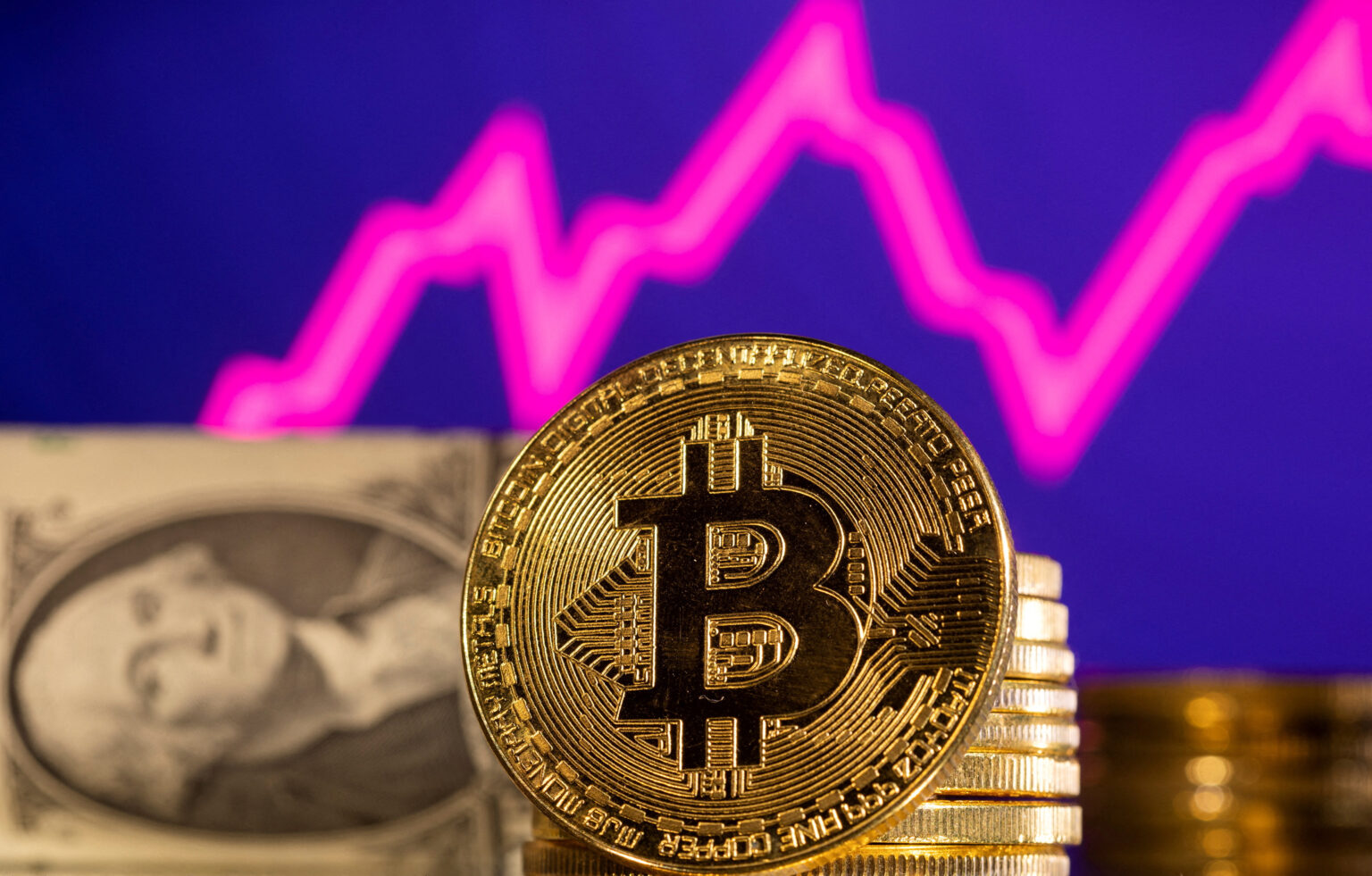- DeFi market is experiencing a surge in Total Value Locked (TVL), and hit nearly $97 billion in Q1 this year.
- Built on blockchain, DeFi bypasses traditional financial systems, allowing peer-to-peer transactions via “smart contracts.”
- At the AIM Congress 2025 in Abu Dhabi—DeFi will be a key topic for global policymakers, regulators, and investors keen on the “Future of Finance”.
The rapid growth of Decentralized Finance (DeFi) is signaling a shift in the global finance ecosystem. Expected to grow at an annual rate of 46 per cent from 2023 to 2030, the DeFi market is experiencing a surge in Total Value Locked (TVL), which has already reached nearly $97 billion in the first quarter of 2024.
It’s worth noting that on Monday, the world’s largest cryptocurrency topped $87,000 for the first time. As of around 3:45p.m. ET, bitcoin‘s price stood at $87,083, per CoinDesk, up over 28 per cent in the last week alone–which part of a rally across cryptocurrencies and crypto-related investments since Trump won the U.S. presidential election last week.
Built on blockchain technology, DeFi bypasses traditional financial intermediaries, allowing peer-to-peer transactions via “smart contracts”—coded agreements that automatically execute transactions under predefined conditions.
This decentralized approach promotes transparency, accessibility, and affordability, reshaping traditional finance and ushering in a more inclusive financial ecosystem.
Origins and foundations of DeFi
The roots of DeFi can be traced back to 2013, when Ethereum co-founder Vitalik Buterin first introduced the concept of expanding cryptocurrencies beyond simple transactions. Buterin’s vision was outlined in the Ethereum white paper, which proposed smart contracts to enable decentralized applications (dApps) on a blockchain network.
Ethereum’s introduction established the foundation for the DeFi movement, and today, the Ethereum blockchain hosts most dApps and holds over half of the DeFi market share. Transitioning from its original energy-intensive Proof-of-Work (PoW) model, Ethereum has since upgraded to the environmentally friendly Proof-of-Stake (PoS) consensus, reducing emissions by 99.9 per cent.
Breaking down traditional barriers
DeFi’s defining feature is its capacity to operate without intermediaries, allowing users to engage directly with financial services. By eliminating banks and other middlemen, DeFi offers several advantages over traditional finance, including reduced costs and faster transaction times.
In conventional systems, intermediaries like banks and clearinghouses slow down transactions, often adding high fees that can make services unaffordable for many. DeFi addresses these challenges, creating a more inclusive environment where people from various economic backgrounds can access financial services.
This decentralized approach also enhances transparency. Transactions conducted via DeFi are recorded on public blockchains, making it possible for anyone to view transaction details and smart contract codes.
This transparency not only builds trust but also aligns with the growing global demand for accountability in financial systems. Additionally, because DeFi platforms are not bound by geographical limitations, they empower people in remote or underserved regions to access global financial markets seamlessly.
Tokenization of real-world assets: Unlocking new possibilities
One of the most compelling innovations within DeFi is the tokenization of real-world assets (RWAs). Through tokenization, physical assets like real estate or commodities are converted into digital tokens on a blockchain.
This transformation enables fractional ownership, liquidity, and transparency, making these assets more accessible and manageable. For example, instead of requiring a significant sum to invest in real estate, tokenization allows investors to buy smaller shares, thus lowering the entry barrier for individuals.
Tokenizing assets in the DeFi space also creates new financial instruments, enhancing the stability and growth potential of the financial ecosystem.
As these tokenized assets circulate within DeFi, they attract new participants, bolster liquidity, and provide established investors with more flexible investment opportunities. This framework not only benefits individuals but also paves the way for innovative funding structures and new market opportunities.
A paradigm shift towards financial inclusion
DeFi’s core principles—transparency, inclusivity, and accessibility—are transforming the financial landscape, particularly for populations historically excluded from the financial system.
According to the World Bank, approximately 1.7 billion people remain unbanked, with limited or no access to banking services. DeFi’s borderless, digital nature can bridge this gap by providing access to essential financial services, such as savings, loans, and investment opportunities, without the need for traditional banks.
The value of DeFi is particularly evident in regions with high inflation and economic instability. For example, users in countries with depreciating currencies can store their wealth in decentralized digital assets, protecting their savings from inflation.
Additionally, DeFi platforms offer users alternatives to traditional loans, where assets like cryptocurrency can serve as collateral. This opens up new channels for credit, supporting small businesses and entrepreneurs in areas where traditional financial institutions may be inaccessible or restrictive.
DeFi’s role in the broader digital finance ecosystem
DeFi is becoming an integral part of the larger digital finance ecosystem, evolving in parallel with technological trends and innovations.
As evidenced by its inclusion in major financial discussions—like those planned for the upcoming AIM Congress in Abu Dhabi—DeFi is capturing the attention of global policymakers, regulators, and investors.
AIM Congress 2025, for example, will explore the “Future of Finance” with a focus on digital transformation and innovation in finance, providing a platform to discuss the implications of DeFi on global markets.
As the DeFi landscape evolves, it aligns with broader trends in the financial sector, emphasizing the need for innovation and adaptation, which is particularly relevant in light of the upcoming 14th edition of AIM Congress, set to take place from April 7 to 9, 2025, in Abu Dhabi.
A key highlight of AIM Congress 2025 will be the “Future of Finance” portfolio, focusing on the theme “Adapting & Adopting: The Roadmap to the Future of the Digitalization of the Finance” This portfolio, featuring a range of interactive activities such as exhibitions, panel discussions, keynote addresses, workshops, and bilateral meetings, intends to connect professionals across the financial sector, providing opportunities to share expertise and discuss best practices in financial innovations like DeFi for a better tomorrow in global finance.
The interaction between DeFi and traditional finance is evolving from one of competition to potential collaboration. Financial institutions are exploring how they can leverage blockchain technology to streamline operations, reduce costs, and offer more flexible services.
With DeFi maturing, the integration of traditional finance and decentralized solutions could yield a more resilient and diversified financial system, enabling stakeholders to meet the demands of an increasingly digital world.
Read also: AIM Congress 2025: The launchpad for aspiring entrepreneurs and future unicorns
Decentralized finance: Addressing challenges and future prospects
While DeFi presents numerous advantages, it also faces challenges that require attention. Security concerns, regulatory uncertainty, and market volatility are prominent issues.
The very nature of DeFi, where transactions are irreversible and often anonymous, has led to vulnerabilities such as hacking, fraud, and exploitation of system flaws. Regulators worldwide are grappling with how to ensure consumer protection without stifling innovation.
To foster sustainable growth, the DeFi sector needs to collaborate with regulators and implement security standards to protect users.
Additionally, decentralized insurance protocols are emerging, offering coverage against potential risks, such as smart contract failures and asset losses due to hacking. These protocols, if widely adopted, could strengthen DeFi’s infrastructure and attract a broader user base by providing an added layer of security.
Looking forward, the DeFi ecosystem is likely to integrate further with traditional financial systems. Ethereum 2.0 and other blockchain advancements are paving the way for DeFi to expand securely and sustainably.
If DeFi can address these regulatory and security challenges, it holds the potential to become a core component of the global financial infrastructure.
Read also: AIM Congress 2025: Where delegates will have a front-row seat to the future of finance
DeFi’s transformative impact on finance
Decentralized Finance is revolutionizing the way the world engages with money, creating a financial landscape where accessibility, transparency, and efficiency are paramount.
By breaking down traditional barriers, DeFi is empowering individuals and businesses alike, fostering a more inclusive and participatory global financial ecosystem.
As DeFi continues to evolve, it represents a paradigm shift that traditional finance can no longer ignore. From tokenization of assets to expanding access for the unbanked, DeFi’s innovations are transforming the financial landscape, proving that the future of finance is both decentralized and democratized.
If supported by thoughtful regulation and ongoing technological advancements, DeFi has the power to reshape economies and redefine the way we think about finance.
In this rapidly evolving digital age, DeFi stands as a testament to what technology can achieve when combined with the desire for inclusivity and autonomy, marking a transformative shift in the world of finance.
AIM Congress 2025, an initiative of the AIM Global Foundation, is set to offer a wide range of activities, including events, forums, dialogue sessions, workshops, and high-level meetings.
The global showcase will also feature the AIM Investment Awards and Exhibition, a startups competition, and expos on country-specific investment opportunities, highlighting eight key portfolios: Foreign Direct Investment (FDI), Global Trade, Startups and Unicorns, Future Cities, Future Finance, Global Manufacturing, Digital Economy, and Entrepreneurs.




